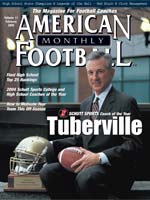Article CategoriesAFM Magazine
|
Coach of the Year - A Season for the AgesAUBURN\'S TOMMY TUBERVILLE WENT FROM BEING A COACH ON THE HOT SEAT TO COACH OF THE YEARby: Richard Scott © More from this issue He knew it was over. Tommy Tuberville and his whole staff would soon be shown the door, despite four consecutive winning seasons, four bowl games and share of thee division titles in five seasons at Auburn University. One more game, against archrival Alabama, and they would all be out looking for new jobs.
|
|
|||||||
| HOME |
MAGAZINE |
SUBSCRIBE | ONLINE COLUMNISTS | COACHING VIDEOS |
Copyright 2025, AmericanFootballMonthly.com
All Rights Reserved





